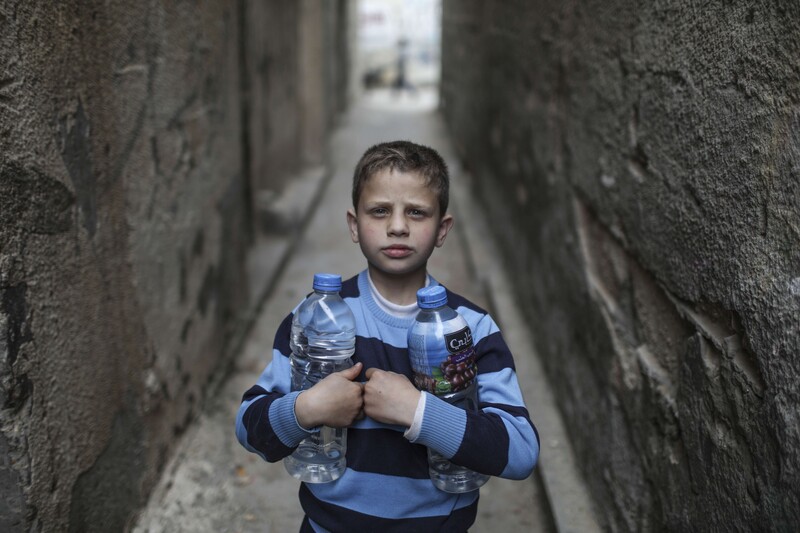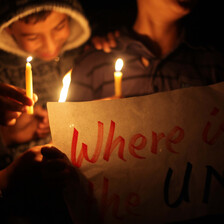The Electronic Intifada 30 May 2017

In blockaded Gaza, obtaining drinking water is one of a series of daily challenges.
XinhuaToday when I woke up, there was no water. All I wanted was to wash my face.
I went downstairs to my parents’ apartment. They too had no water.
“There is no electricity, son,” my mother said. “No water has been pumped into the tank.”
I had stored some bottles filled with water in the kitchen. I washed my face with that.
First mission of the day accomplished.
I made some coffee on the gas stove and sat myself down. We only get four hours of power in our area, the Maghazi camp in Deir al-Balah.
The problem has been getting worse over the past months.
I had just come back to Gaza from Cairo where my wife had been receiving medical treatment. I had spent six months there at her side. Now I had to get back to work.
I use a little rechargeable battery that keeps me connected to the Internet. My laptop was charged. I could read the news and check my email. To my relief, after an hour and a half, the power came back.
Happily, I plugged in my laptop and began listening to clips of interviews I had done earlier. But I only got through two out of five when the power went again. I put aside my work and picked up the phone.
Annoyed
I had not seen Abu Walla for six months, but I knew he would be taking a break now. Abu Walla is a tailor who fixes shirts and trousers and he works from a shop in my neighborhood. His sewing machine needs power so this seemed like an opportune time to say hello.
I bought some coffee from a nearby vendor which we drank in the shop. Talk, as it always does, turned to politics: the hated division among Palestinians and a siege that is holding nearly two million people in Gaza hostage.
When the power came back, Abu Walla and I shook hands and went about our business.
I had been working up a draft and listening to more interviews when my daughter, Nadine, 13, came back. “Mom,” I heard her ask my wife, “can I take a shower?”
I had to put my work away again. I was getting annoyed, annoyed at myself for not being able to ensure that my children have running water in their home. Soon, Muhammad and Aseel will be back too.
I phoned my eldest son, Munir. “Call the water seller and have him fill the tanks, whatever it costs,” I said.
Gaza lacks clean drinkable water. This has been the case for years and so water trucks are a common sight.
But they have become more common over the past 10 years as the Israeli siege has tightened and after repeated Israeli bombings of Gaza’s only power plant, starting in 2006, leaving electricity at a premium.
Costly business
Of course, private water purification plants hike their prices and buying water is a costly business. But with only four hours of power a day, we, the 35,000 people of Maghazi, have little choice: It is only during those hours that the municipality can pump water. We have to buy.
Buy we did. My children showered. Clean, at least for another day.
As evening fell, Al Mohandes, the private firm which supplies power to our camp, switched on its generators. The company offers its service in addition to the municipal power supply and helps us secure another four to five hours of power a day. At a price.
Gaza is mainly reliant on electricity bought from Israel for its power needs. That electricity has been paid for by the Palestinian Authority in the occupied West Bank.
Yet the PA announced in April that it was ending its payments for electricity from Israel.
The announcement was made amid tensions between Fatah, the dominant party in the PA, and its rival Hamas, which administers Gaza. The dispute over money has meant that since mid-April, Gaza’s own power plant has also run out of fuel, creating a humanitarian crisis.
More recently, the PA has requested that Israel cut its electricity supply to Gaza even further.
It may be a dispute over money. It may be politics. It certainly hurts us, the ordinary Palestinians of Gaza.
For now, my family has water bought from a private company and electricity from another private company. We live another day. Tomorrow I will just have to wash my face in bottled water again.
Rami Almeghari is a journalist and university lecturer based in the Gaza Strip.





